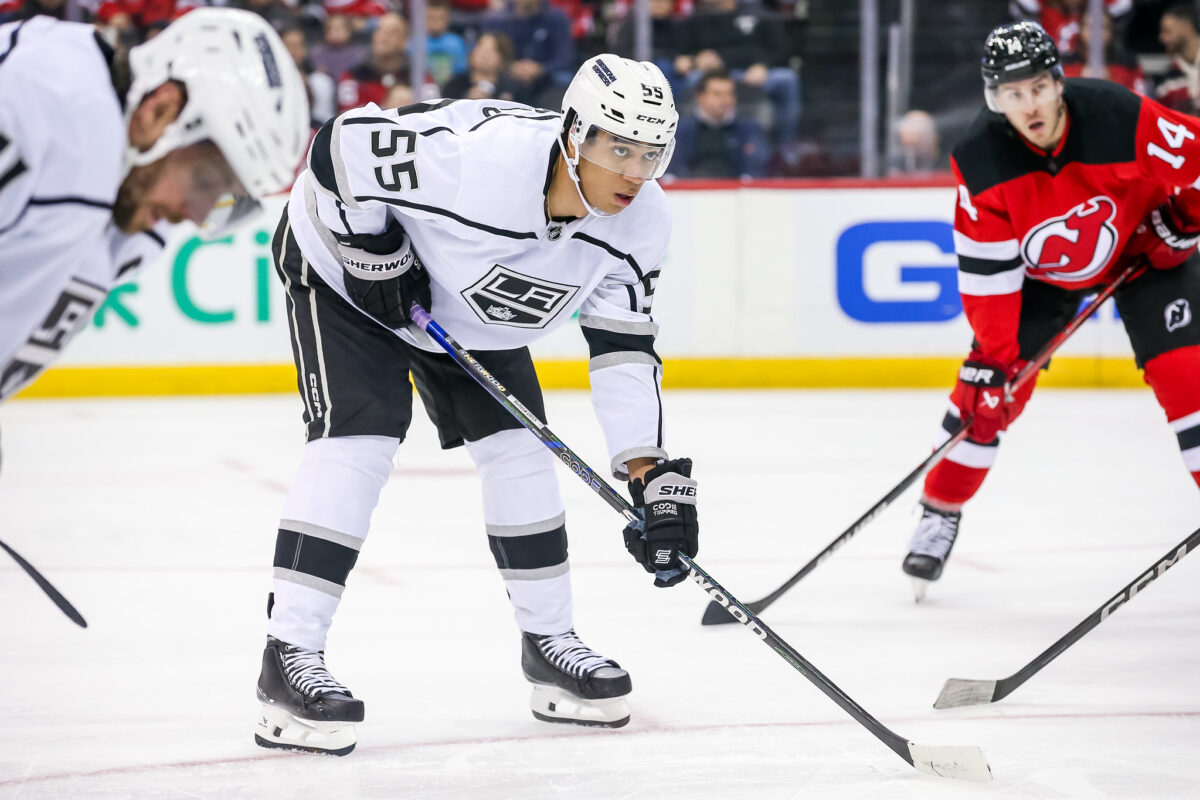A top prospect in the 2019-20 season, Quinton Byfield has always been in Alexis Lafreniere’s shadow. Lafreniere was viewed as one of the next great Canadian forwards, poised to turn a franchise around. Byfield was the consensus second-best prospect, at times leading to fans asking if he could push for the first overall draft pick. Both Byfield and Lafreniere had lackluster starts to their NHL careers but broke out this past season. Lafreniere is a free agent in 2025, but Byfield’s contract expires this offseason. So, what could his next contract look like?
Finding the Value
Byfield is in a unique position entering his next contract. The 21-year-old just finished the final year of his entry-level contract, so there is not much sample size to evaluate. During his first season with the Kings, he played just six games. The following two seasons he had just eight goals and 32 points in 93 games before having 20 goals and 55 points in 80 games this season. While there is little doubt he will continue his success, there is an inherent risk in giving him a lot of money with just one impressive season under his belt.
Related: Jacob Markstrom Blocked Trade to the Los Angeles Kings
There are two likely blueprints for his next contract. The first, and more likely, is a bridge deal. This would be a three-year deal where he is once again a restricted free agent when the contract expires. He would still be locked into the Kings’ organization, at least for a few more seasons, as they would maintain team control, but he would also set himself up for a bigger contract extension then if his play continues to improve.
Comparables for Byfield
The three-year deal would be similar to that of Dylan Strome and Martin Necas’ recent contract extensions. Strome and Necas both signed two-year, $3 million average annual value (AAV) deals as restricted free agents. Byfield has similar production to Strome and Necas and is likely in line for a similar value contract if looking for a bridge deal. For a three-year deal, he would likely come in at $3.5 to $4 million AAV, with the contract navigated to have his final year make a qualifying offer in the $7 million range. This structuring idea is common among young players in today’s game, with Charlie McAvoy being one of the notables to utilize this format in negotiations in 2019.
A less likely, but possible contract would be a long-term deal. In the seven to eight-year range, both Byfield and the Kings would be making a gamble. Byfield’s continued development is likely, making it a risk worth taking for Kings’ management, but likely not for Byfield as he would not garner the annual value he may seek.

Comparables for this deal would be Minnesota Wild forwards Matt Boldy and Joel Eriksson Ek. Boldy, with not even one full season under his belt, signed a seven-year, $7 million AAV contract extension with the Wild. Eriksson Ek, without yet surpassing 30 points in an NHL season, signed an eight-year, $5.25 million AAV contract in July 2021. Both contracts were risks taken by the Wild organization that they are now happy they took.
Many other young stars were given long-term contracts that were viewed as risks by many at the time of signing, such as Jack Hughes and Tim Stutzle, but are now viewed as bargains. The Kings taking this approach is risky, but signing Byfield to an eight-year contract at around $7.5 million, right between Boldy’s $7 million AAV and Hughes’ $8 million AAV, would set Byfield up financially for a lifetime as well as provide the Kings with a potential team-friendly deal in the long-term.
As the summer approaches, there is still plenty of time for Byfield to prove his worth in his next contract. Also, other pending free agents, such as Casey Mittelstadt, Dawson Mercer, and Matthew Beniers, could sign, helping to frame Byfield’s next deal. Considering he has only had one dominant season in the NHL, his next contract will pose a risk to both sides, marking one of the most intriguing pending free agents to follow for this offseason.
